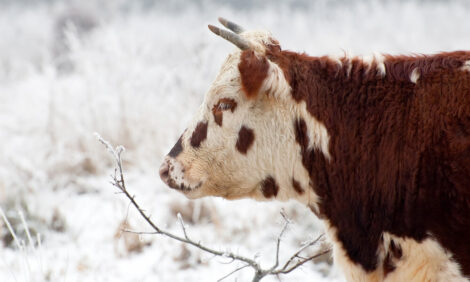



No Room for Complacency over Schmallenberg
SCOTLAND, UK - NFU Scotland is warning livestock farmers against complacency after its ongoing surveillance for Schmallenberg virus (SBV) continued to show lower than expected levels of activity across Scotland.NFU Scotland, with assistance from SRUC and Biobest, has been monitoring a network of dairy farms across Scotland for presence of the virus in their bulk milk and no positives have yet been confirmed. Veterinary surveillance has found new cases of SBV in Scotland this year and the Union is urging livestock farmers to continue working with their vets on a strategy that would minimise the impact of the virus on their cows and sheep were they to be exposed to it.
Spread by midges, SBV was first identified on German and Dutch farms in 2011 and has since spread throughout Europe with almost 2000 cases in the UK. There remains the expectation that the virus will be circulating more widely in Scotland this year. The Union wrote to all its members about SBV in the summer and is planning to extend its monitoring programme this autumn so that it can continue to track any spread of SBV.
Exposure to SBV can result in relatively mild conditions in cattle and sheep but where infection takes place during the early stages of pregnancy (25-50 days in sheep, 70-120 days in cattle); it can result in congenital disorders of lambs and calves. Infection also causes a drop in milk production and may also be linked to poor breeding performance.
The recent availability of a vaccine means it may be possible to vaccinate sheep and cattle before they become pregnant and Scottish farmers with early lambing flocks and autumn calving herds should be discussing with their vets whether vaccination could help protect their stock.
NFU Scotland President, Nigel Miller said: “While our surveillance has yet to show any significant spread of the virus, and the number of positive cases identified through veterinary surveillance grows slowly, I would urge all livestock farmers not to take their eye of this disease. The vast majority of livestock in Scotland remain vulnerable to this virus.
“Experience in England and other parts of Europe suggests that the spike in viral activity may still be to come and recent warm temperatures may be storing up problems for later in the year. That means for those with early lambing flocks and autumn calving herds, now is the time to sit down with your vets and think about protecting stock before the rams or the bulls go out.
“While vaccination comes at a cost, the losses generated by infection of animals while pregnant are stark. The costs associated with stillbirths or caesarean sections to remove deformed lambs or calves could soon mount up if a herd or flock becomes compromised at a crucial time in the breeding cycle.
“NFU Scotland wrote to all its members in July, urging them to assess if their livestock are at risk of contracting SBV. If the answer is yes, then our advice remains that you should, in conjunction with your vet, put an action plan in place.
“Animals can now be vaccinated ahead of breeding to provide protection during the vulnerable stage of early pregnancy and that may be an important tool for many livestock keepers in next few months.”
TheCattleSite News Desk


